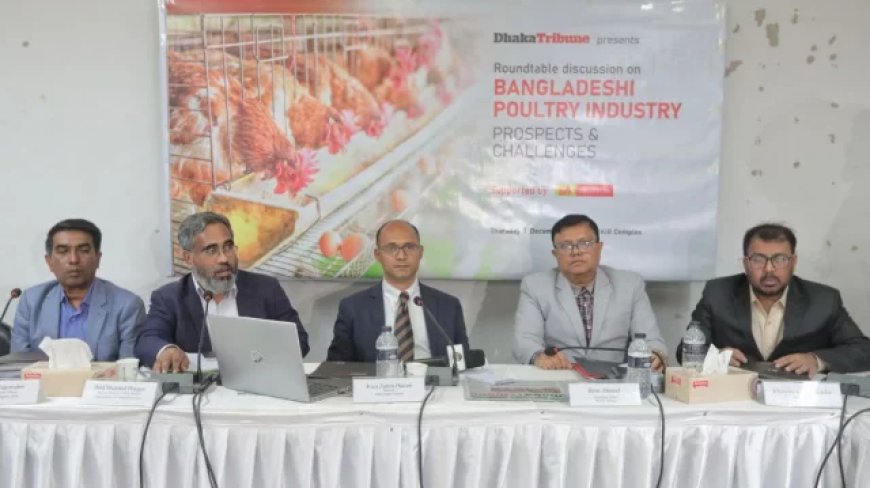Speakers emphasize the need to study the poultry market thoroughly before filing baseless cases
The event titled "Bangladeshi Poultry Industry: Prospects and Challenges," hosted by Dhaka Tribune in partnership with Kazi Farms, gathered stakeholders to address the challenges faced by farmers, including risks and regulatory obstacles.

Bangladeshi Poultry Industry Faces Challenges and Opportunities
A roundtable titled "Bangladeshi Poultry Industry: Prospects and Challenges," organized by Dhaka Tribune in collaboration with Kazi Farms, highlighted pressing issues within the sector. Held at the Krishibid Institution Bangladesh (KIB), the event brought together stakeholders to discuss financial losses, regulatory barriers, and potential solutions.
Key Discussions:
Economic Losses and Market Dynamics
Speakers noted that 60,000 poultry farms have shut down due to financial losses. Kazi Zahin Hasan, Director of Kazi Farms Limited, emphasized that the poultry market is highly competitive, with thousands of sellers. He argued that fluctuating supply and demand—not syndicates—drive price changes.
Regulatory Concerns
Barrister ABM Hamidul Mishbah criticized the Competition Commission for filing baseless cases against producers, which discourages investment and disrupts market stability. Former Commission Director Khalid Abu Naser added that accusations of price manipulation require thorough economic analysis and proper data.
Market Challenges
Prof. Rushad Faridi from Dhaka University stressed that most essential commodity markets in Bangladesh are competitive but require detailed research to determine if syndicates influence prices. Deputy Director Md. Shariful Haque outlined government efforts to bridge the gap between production costs and consumer prices, while Mahbubur Rahman of the Breeders Association of Bangladesh (BAB) called for minimizing middlemen's profits to support struggling farmers.
Policy and Structural Solutions
Aanjan Majumder, CEO of Bangladesh Organic Hub, advocated for the creation of a National Poultry Board to streamline coordination among 10 ministries and 14 departments. He also noted that climate change has adversely impacted production.
Production and Supply Chain Insights
Farmers, including Kawser Ahmed, described how fluctuating costs and market volatility have forced many to downscale operations. Industry representatives highlighted that feed and chick prices are influenced by global raw material costs and currency fluctuations. Suggestions included temporary imports of eggs and chicks to address shortages and developing insurance products for farmers.
Role of Media and Public Perception
Speakers criticized sensational media reports on syndicates, urging a more nuanced approach to understanding market complexities. Improved communication with rural farmers was suggested to enhance reporting accuracy.
The event underscored the need for comprehensive research, policy reforms, and stakeholder collaboration to stabilize the poultry industry and ensure its sustainable growth.
What's Your Reaction?




















































































